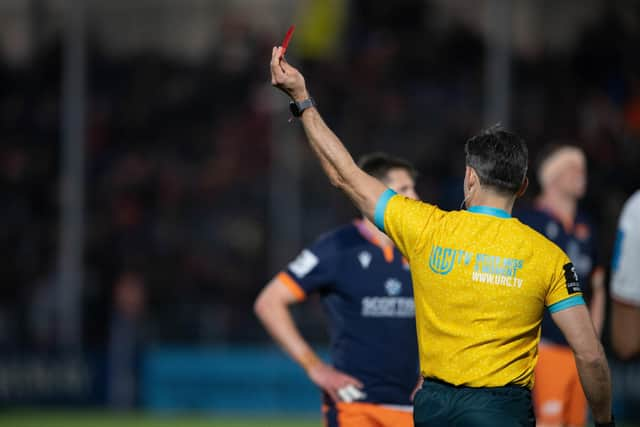Rugby rules changes: 20-minute red card trial and outlawing of Dupont's Law under consideration
World Rugby is considering a global trial of a 20-minute red card as part of a raft of radical plans to broaden the appeal of the sport.
The proposal, where the player sent off is replaced by a substitute after 20 minutes has elapsed, will potentially go before the governing body’s council in May. Introducing a shot clock for scrums and lineouts, outlawing the ‘crocodile roll’ clearout at rucks and lowering the tackle height in the elite game to the base of the sternum are among the other possible rule changes.
Advertisement
Hide AdAdvertisement
Hide AdWorld Rugby will also seek to close the “Dupont’s Law” loophole in a bid to “reduce kick tennis”, the kind of which was seen in Scotland’s recent match with France. So named because it was France scrum-half Antoine Dupont who first exploited it, the law relates to players being put onside when the ball is kicked in open play once the kick receiver has passed the ball or moved five metres with it. This has led to lengthy kicking battles which are dull and have proved unpopular with spectators.


More immediately, referees have been told to call “use it” earlier at breakdowns in a bid to speed up play and eradicate the use of ‘caterpillar rucks’, and also crack down on water-carriers entering the pitch. The recommendations follow World Rugby’s ‘shape of the game’ forum held last month in an effort to enhance rugby’s entertainment factor.
Twenty-minute red cards would ensure the offending player and their team are punished without spoiling the spectacle, particularly following an early dismissal. The rule has proved popular in the southern hemisphere, where it has been trialled in Super Rugby Pacific.
In addition to potentially expanding the use of a shot clock, which is currently used for penalties and conversions, unions and competition owners will be encouraged to stage further closed-law trials. These include the ball being played after the maul has been stopped once, not twice, further protection of scrum-halves at the base of rucks and scrums and play on if a lineout is not straight but the throw is uncontested.
Meanwhile, a specialist working group will examine the impact of the lowering of the tackle height in community rugby in 2023 to consider its “appropriateness” for elite rugby. The role of the television match official will also be evaluated, in addition to a review of how and when replacements are used.